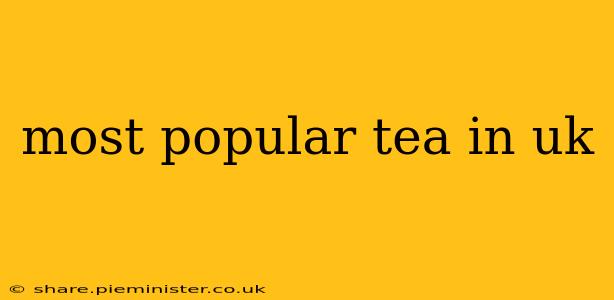The UK boasts a rich tea-drinking culture, a tradition deeply woven into its social fabric. From the humble builder's brew to elegant afternoon teas, tea is more than just a beverage; it's a ritual. But with so many varieties available, which teas reign supreme in the hearts (and teacups) of Britons? This exploration delves into the most popular teas in the UK, uncovering the reasons behind their enduring appeal.
What is the most popular type of tea in the UK?
While precise figures fluctuate depending on the source and year, black tea consistently claims the top spot as the most popular type of tea in the UK. Its robust flavour, versatility, and relatively low cost contribute significantly to its widespread popularity. Within the black tea category, specific blends and brands further solidify their dominance in the market.
What is the most popular brand of tea in the UK?
Determining the single most popular brand is challenging due to fluctuating market share and varying data sources. However, brands like PG Tips, Tetley, and Yorkshire Tea consistently rank among the top contenders. These brands have established strong brand recognition, often leveraging nostalgia and marketing campaigns targeted at specific demographics. Their widespread availability in supermarkets and convenience stores further reinforces their popularity.
What are the different types of tea?
Understanding the broader tea landscape helps appreciate the UK's preference for black tea. Tea, broadly categorized, comes from the Camellia sinensis plant. The processing methods determine the type of tea:
- Black Tea: Fully oxidized leaves, resulting in a strong, robust flavour.
- Green Tea: Minimally oxidized leaves, boasting a lighter, vegetal taste.
- White Tea: The least processed, featuring delicate, subtly sweet notes.
- Oolong Tea: Partially oxidized, offering a spectrum of flavours between green and black teas.
- Herbal Teas (Tisanes): Infused beverages made from various herbs, flowers, and fruits – technically not "true" teas as they don't come from the Camellia sinensis plant.
Is tea more popular than coffee in the UK?
While coffee consumption has significantly increased in recent years, fuelled by the specialty coffee shop boom, tea remains the more popular hot beverage in the UK. This preference is rooted in long-standing tradition and cultural norms, though the gap between tea and coffee consumption is narrowing.
Why is black tea so popular in the UK?
The popularity of black tea in the UK stems from several factors:
- Strong Flavour: Black tea's robust character appeals to many palates. It stands up well to milk and sugar, making it a comforting and satisfying beverage.
- Affordability: Black tea is generally less expensive than many other tea types, making it accessible to a wider range of consumers.
- Versatility: Black tea can be enjoyed in various ways – plain, with milk and sugar, in iced tea variations, or as a base for more complex tea blends.
- Historical Significance: Black tea's longstanding history in the UK, tracing back centuries, has cemented its place in the national identity.
What are some other popular teas in the UK besides black tea?
While black tea reigns supreme, other types of tea enjoy notable popularity:
- Earl Grey: A black tea infused with bergamot oil, adding a distinctive citrusy aroma and flavour.
- English Breakfast: A robust blend of black teas, often including Assam and Ceylon varieties.
- Chai: A spiced black tea originating in India, growing increasingly popular in the UK.
- Green Tea: Although less prevalent than black tea, green tea's health benefits and lighter flavour profile attract a growing segment of consumers.
This exploration highlights the enduring appeal of tea in the UK, particularly black tea's dominance. However, the ever-evolving tastes and preferences of British consumers ensure the tea landscape remains dynamic and exciting. The future of tea in the UK is undoubtedly steeped in tradition, yet infused with innovation and new tastes.
